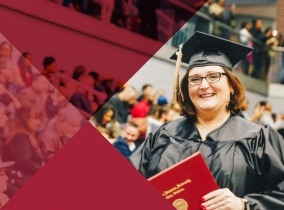-
Programs
Not Sure Where to Start?
- Associate Programs & Certificates
- General Studies
- Associate of Arts in Business
- Physical Therapist Assistant
- Professional Services & Certificates
- Special Education Bootcamp
- View All
- Undergraduate Programs
- Business Administration
- Criminal Justice
- Cybersecurity
- Education
- Family Studies and Gerontology
- Healthcare Administration
- Organizational Leadership
- Accelerated General Education
- View All
- Graduate & Doctorate Programs
- Doctorate of Education in Administration & Leadership
- M.A. Administration of Special Ed.
- M.A. Applied Psychology
- M.A. Educational Leadership
- M.A. Sports Management & Administration
- M.A. Teaching
- MBA, 12- 18 months
- MBA - Healthcare Administration
- Master of Organizational Leadership
- M.S. Counseling Psychology
- M.S. Exercise Science - Health & Human Performance
- M.S. Exercise Science - Wellness
- M.S. Instructional Design Technology
- M.S. Management
- M.S. Physician Assistant
- Alternative Certification (Teaching or Special Ed.)
- View All
- Resources
- Tuition & Aid
- Military
The Complete Guide to Funding Your Teaching Degree

Introduction
Teaching can be an incredibly rewarding experience. The opportunity to make a difference in students' lives by shaping young minds and futures is unique to a career in education. Many young people passionate about teaching want to pursue education but find it hard to afford their degree. Financial support for teachers to complete their bachelor's or master's degrees is more important than ever nationwide, especially in Oklahoma.
According to the Bureau of Labor Statistics, teachers who pursue higher education make significantly more than those who do not. Paraprofessionals in the classroom can expect an average salary of $35,550, while those with a Bachelor’s degree earn significantly more with the national average of $63,670 annually. Educators with a Master’s degree typically seek leadership or administrative roles, such as a school principal and average a salary of $103,460 annually. For a more comprehensive list of average salaries for teachers and school staff, the Oklahoma Dept of Education maintains a database of average annual earnings.
Most teachers would agree that their profession is not all about the salary, but it is one full of heart and one that is greatly needed. America is facing a national teacher shortage, leaving 55,000 vacant positions and an additional 270,000 teaching posts filled by underqualified teachers. With a higher-than-ever need for teachers, educators in Oklahoma and across the country face many challenges. Financial support through grants and loan forgiveness may help alleviate some of these challenges.
Download a PDF version of this guide by filling out this form, or keep scrolling to learn more.

Chapters
Leverage Grants to Complete Your Degree
Student Loans and Loan Forgiveness Programs for Teachers
Employer Tuition Reimbursement and Continuing Education
Prior Learning Credit for Life Experience
Partnership Sites with Deep Discounts
Support at SNU

Leverage Grants to Complete Your Degree
Teachers can leverage various grants to fund their education and professional development. By applying for these grants, teachers can access essential funding to enhance their skills and advance their careers without incurring substantial debt. Navigating grants can be tricky, but we have compiled a short list of grants available for teachers.
Federal Grant Opportunities
- Federal Pell Grant—Pell Grants are need-based grants usually only awarded to undergraduate students. Grant amounts vary by year and by person. For more information or to apply for a Federal Pell Grant, please visit the Federal Student Aid Website.
- TEACH Grant - The Teacher Education Assistance for College and Higher Education (TEACH) Grant Program provides grants of up to $4,000 per year to students who are completing or planning to complete a degree to prepare them for a career in teaching. Students enrolled less than full-time can receive a prorated amount of TEACH Grant funds. The TEACH Grant differs from other student grants because it requires grantees to agree to complete a teaching service obligation to receive the grant. Grantees must sign a TEACH Grant Agreement to Serve or Repay in which they agree to:
- Teach full-time for four elementary or secondary school years at a school or education service agency that serves low-income students;
- Teach in a high-need field; and
- Complete the required four years of teaching within eight years after you graduate or otherwise cease to be enrolled in the higher education institution for which you received your TEACH Grant.
For those who don’t complete the service obligation, the TEACH grant will be converted to an Unsubsidized Direct Student Loan, and the interest will be backdated to the date they receive the TEACH Grant. For more information or to apply for the TEACH Grant, please visit the Federal Student Aid Website and make sure you reach out to your Financial Services Coordinator at the university. FSA doesn't share student information, so unless you let your school know you've applied, they will be in the dark!
Grants for Teachers in Oklahoma
Teachers in Oklahoma can benefit from a variety of grants. Some grants are specific to Oklahoma and are only offered to teachers in the state. Other grants are federal grants that can benefit teachers in Oklahoma and all over the country. Grants differ from student loans as they are considered “gift aid” and are not expected to be repaid. However, some grants may have certain requirements for grantees.
State Grant Opportunities
- Oklahoma Foundation for Excellence (OFE) - Founded by Oklahoma U.S. Senator in David L. Boren in 1985, OFE began as a group of Oklahoma business and community leaders who agreed that private investment was crucial to the success of public schools. The result was the establishment of a statewide, nonprofit organization, with the mission of recognizing and encouraging academic excellence in Oklahoma’s public schools.
Oklahoma public school teachers can benefit from the Fund for Teachers program. Since 2006, the program has awarded over $3.2 million in grants to more than 940 Oklahoma teachers. Made possible through bridge funding from the National Fund for Teachers and financial support from the Tulsa Community Foundation, the Fund for Teachers provides the opportunity for Pre-K through 12th-grade teachers in Oklahoma to pursue self-designed professional learning through a fellowship.
This program facilitates professional development for teachers, funding learning opportunities designed by teachers who choose what they want to learn and where they want to learn it. Please visit their website for more information about OFE’s Fund for Teachers.
Oklahoma educators can also be nominated for the Oklahoma Medal for Excellence. One of Oklahoma’s premiere educator awards, the OFE recognizes five public school educators each year for their passion, innovation, commitment to professional development, and impact on student learning. Honorees are recognized at the Academic Awards Celebration in May and receive a medal, an etched glass Roots and Wings sculpture, and a $5,000 cash award.
Anyone, including colleagues, parents, students, former students, or community members, can nominate a public school educator for an Oklahoma Medal of Excellence Award. The award categories are Elementary Teaching, Secondary Teaching, Elementary-Secondary Administration, Regional University-Community College Teaching, and Research University Teaching. For nomination information, award criteria, and more, please visit their website.
- Oklahoma Teacher of the Year - All Oklahoma pre-k through 12th grade teachers in state-accredited schools are eligible to be nominated for the Oklahoma Teacher of the Year. There is no minimum requirement for years of teaching experience for a teacher to be qualified for nomination.
The Oklahoma Teacher of the Year winner serves as an ambassador for teachers, traveling to Oklahoma for the following school year while continuing to get paid by their district. For more information, please visit their website or send questions to teacheroftheyear@sde.ok.gov.

Student Loans and Loan Forgiveness Programs for Teachers
Student loans can be a valuable resource for teachers looking to finance their college education. Federal student loans, such as subsidized and unsubsidized loans, offer a structured way to cover educational expenses. Subsidized loans are need-based, and the government pays the interest while the borrower is in school, which can significantly reduce the overall cost of borrowing. Unsubsidized loans, available to all eligible students regardless of financial need, accrue interest from the time they are disbursed, but they offer flexible repayment options and competitive interest rates.
In addition to federal loans, teachers may also consider private student loans to bridge any gaps between their financial aid and the total cost of their education. Banks and other financial institutions offer private loans that can vary widely in terms of interest rates, repayment terms, and eligibility requirements. While private loans can provide additional funding, it's important to carefully compare options and understand the terms before borrowing. Combining federal and private loans can help teachers manage their educational expenses effectively, though careful planning and budgeting are crucial to ensuring manageable repayment after graduation. It is important to note that private loans are not eligible for Federal Student Loan Forgiveness programs.
Federal student Loan Forgiveness Programs can offer significant debt relief to teachers trying to pay for their education. While student loans are different from grants in that they are money that is expected to be repaid, Student Loan Forgiveness Programs can help graduates by pardoning a portion, if not most, of federal student loan debt.
Federal Loan Forgiveness Programs
- Public Service Loan Forgiveness - Public Service Loan Forgiveness (PSLF) is the most commonly used loan forgiveness program for teachers. PSLF forgives the remaining balance of federal Direct Loans after 120 qualifying payments (estimated over 10 years). Unlike other programs, PSLF does not require recipients to teach at low-income public schools. Instead, recipients are required to work for a qualifying employer. This includes government organizations, tax-exempt nonprofit organizations, and nonprofit organizations that provide certain qualifying public services. Please visit the Federal Student Aid Public Service Loan Forgiveness webpage for more information.
- Teacher Loan Forgiveness - Teacher Loan Forgiveness (TLF) forgives up to $17,500 of Direct or Federal Stafford Loans after five complete consecutive years of full-time teaching at a qualifying school. At least one of those years must have been after the 1997-98 academic year. Most eligible teachers can qualify for up to $5,000 in loan forgiveness, while certain highly qualified special education teachers and secondary math or science teachers can qualify for up to $17,500. PLUS Loans and Perkins Loans are not eligible for loan forgiveness through this program. Please visit the Federal Student Aid Teacher Loan Forgiveness webpage for more information.
- Perkins Loan Cancellation for Teachers - This program applies exclusively to Perkins Loans and forgives up to 100% of Federal Perkins Loans for those teaching full-time at low-income schools or may apply to those teaching certain subjects. These subjects include math, science, foreign languages, bilingual or special education, or different subjects determined by state education agencies to be in shortage of qualified teachers in that state. Private school teachers may qualify if their school has established its nonprofit status with the IRS and is providing elementary and/or secondary education in accordance with state law. Please visit the Federal Student Aid Federal Perkins Loan Cancellation webpage for more information. Even though the Perkins Loan Program ceased awarding students in 2018, students who received a Perkins Loan before that date could still be eligible for teacher cancelation.
State-Sponsored Loan Forgiveness Programs
Many states offer loan forgiveness programs for teachers, especially those who teach in high-need areas. To learn more about what is available in your state, use this database to find your state contacts. State contacts for Oklahoma are listed as the Oklahoma Department of Education, Oklahoma State Higher Education Agency, Oklahoma Special Education Agency, and Oklahoma State Adult Education Agency. Teachers in Oklahoma may benefit from the Teacher Shortage Employment Incentive Program (TSEIP).
- Teacher Shortage Employment Incentive Program - The TSEIP is a legislative ruling administered by the Oklahoma State Regents for Higher Education designed to recruit and retain math and science teachers in the state of Oklahoma. Eligible students will be reimbursed for allowed student loan expenses or an equivalent cash benefit. Student loan programs eligible for TSEIP include:
- Stafford Student Loans/Guaranteed Student Loans
- Perkins/National Direct Student Loans
- Loans made under the federal Supplemental Loans for Students program
- Consolidation Loan Program loans
- Privately funded educational loans issued to students through colleges or universities
For more information about TSEIP, including TSEIP coordinator contact information for Oklahoma colleges and universities, please visit the TSEIP webpage. To contact Southern Nazarene University’s TSEIP Coordinator, Dr. Tim Taylor, please call 405.717.6267 or email ttaylor@snu.edu.
Teacher loan forgiveness programs can significantly ease the financial burden of completing a degree, making education more affordable. These opportunities enhance the appeal of teaching as a career by offering the chance to pursue a fulfilling profession with minimal student loan debt, requiring a level of education similar to other fields but with the added benefit of making a meaningful impact.

Employer Tuition Reimbursement and Continuing Education
Many employers offer tuition assistance programs as a benefit to support employees seeking higher education that aligns with their job responsibilities. For teachers, this means that if you're pursuing a degree program or certification relevant to your role, such as an advanced degree in education or specialized training, your employer might cover a portion or all of your tuition costs. These programs are designed to encourage professional development and help employees advance their skills, benefiting both the individual and the organization. To take advantage of this, you should inquire about the specifics of your employer’s tuition reimbursement policy, including eligibility criteria, reimbursement limits, and the process for applying.
To maximize employer tuition assistance benefits, it's important to plan ahead and understand the requirements. Some employers may have specific guidelines about the types of courses or degrees that qualify for reimbursement, and there might be deadlines for submitting your coursework and grades. Additionally, maintaining a certain grade point average may be necessary to qualify for reimbursement. By staying informed and proactive, teachers can get the most out of these programs to reduce their educational expenses and advance their careers without bearing the full financial burden of further education.
Continuing Education Funding
Teachers seeking to advance their careers can explore cost-effective educational programs like the Special Education Bootcamp and alternative certification pathways, which might also open doors to employer-sponsored funding. The Special Education Bootcamp at Southern Nazarene University offers an intensive 8-week course designed for those with a bachelor’s degree, leading to provisional Special Education certification. This program is particularly advantageous because the credits earned can be applied towards a Master of Arts in Administration of Special Education. By demonstrating how this program benefits both immediate certification and long-term educational goals, teachers may persuade their employers to support the cost, even if a formal tuition reimbursement program isn't in place.
Similarly, Oklahoma’s alternative certification programs provide a streamlined and affordable route for individuals with non-education degrees to enter the teaching profession. These programs, often available online, allow participants to earn certification and advance their education simultaneously. Even if your employer doesn’t offer a dedicated tuition reimbursement plan, they might still be willing to invest in your professional development through these programs.
By highlighting the alignment of these educational opportunities with your career growth and the potential benefits for your role, you can make a strong case for your employer to fund your continuing education. This approach not only reduces your financial burden but also supports your career advancement goals.

Prior Learning Credit for Life Experience
Southern Nazarene University is committed to supporting educators at various stages of their careers through programs tailored to their needs. By offering flexible pathways with significant discounts, SNU is opening doors for professional development and career advancement for teachers.
One way SNU does this is through Prior Learning Credits. Paraprofessionals seeking a bachelor's degree in teaching can receive transcripted credits for their existing knowledge and experience at no cost. This means that their practical experience in the classroom, professional development courses, certifications, and even volunteer work can be evaluated and counted towards their degree requirements. For instance, a paraprofessional with extensive hands-on experience and relevant career training can receive academic credit for that prior learning, which can significantly reduce the number of courses they need to take, streamlining their path to graduation.
SNU’s approach to prior learning credit is that students deserve credit for what they know! Instead of charging full tuition for additional credits earned through prior learning assessments, SNU includes these credits as part of the total program cost. This integration helps you avoid extra fees and keeps your education affordable.
For anyone pursuing a Bachelor of Arts in Education at Southern Nazarene University, prior learning can significantly reduce out-of-pocket expenses, potentially saving up to $12,000. SNU's Prior Learning Assessments recognize the value of real-world experiences and previously acquired knowledge, which can be translated into academic credit. You can accelerate your degree progress and lower tuition costs by evaluating and applying credits for professional experience, certifications, and other non-traditional learning. This means you can complete your degree more quickly and with fewer credits to purchase, directly impacting your overall expenses.
-1.png?width=1080&height=748&name=block%20(1)-1.png)
Partnership Sites with Deep Discounts
Another way that SNU helps make higher education more accessible for teachers is through our school district partnership programs. The partnerships, currently active with several districts in the OKC and Tulsa areas, offer a valuable opportunity for educators to advance their careers through a range of affordable graduate programs at a significant discount - about 40% off regular tuition! These partnerships allow teachers to pursue their Master’s in Educational Leadership with embedded school principal certification, a Master’s in Administration of Special Education with embedded school principal certification, or a Master’s in Teaching. Designed to equip future school leaders with practical knowledge from experienced administrators, the partnership program also benefits school coaches and physical education teachers by offering a Master of Science in Exercise Science or a Master of Arts in Sports Management Administration degree option.
Classes for these programs are conveniently held on-site at participating schools, eliminating extra fees and making it easier for educators to balance their professional and academic commitments. This initiative not only supports career growth for current educators but also addresses the need for qualified leaders and specialists across the region.
SNU is here to support you in your continuing education journey. Whether you’re looking for a program with multiple outcomes, like continuing education credits that will also count towards your master’s degree, or if you have questions about financial aid, we’ve got you covered. Our outstanding team of enrollment specialists, academic advisors, and educators works together to make sure you have everything you need to succeed in your journey to becoming an educator or advancing your career in education.

Support at SNU
Depending on your needs, There are many ways to contact SNU. Whether you’re looking for information about our specific education programs, how to contact one of our dedicated admissions counselors, or how to contact our amazing Financial Aid office, SNU is here to support you.
- Education Program Information
-
- Bachelor of Arts in Education (BAE) - Visit our program webpage or contact Program Co-directors Dr. Anne Ghost Bear or Dr. Ron Titus.
-
- Master of Arts in Teaching (MAT) - Visit our program webpage or contact Program Director Ms. Julia Monroe.
-
- Master of Arts in Educational Leadership (MAEL) - with embedded Principal certification - Visit our program webpage or contact Program Director Dr. Stephoni Case.
-
- Master of Arts in Administration of Special Education (MAASE) - with embedded Principal certification - Visit our program webpage or contact Program Director Dr. Lynnette Thompson.
- Admissions
-
- To speak with an admissions counselor, please contact pgsadmissions@mail.snu.edu or call 1-888-SNU-GRAD.
- Financial Aid
-
- Please visit our Financial Aid webpage for more information about Financial Aid or contact the SNU's Financial Aid office finaid@snu.edu or call (405) 491-6310
Want This Planner Delivered to Your Inbox?
Simply fill out this form to receive a PDF version of our guide.















